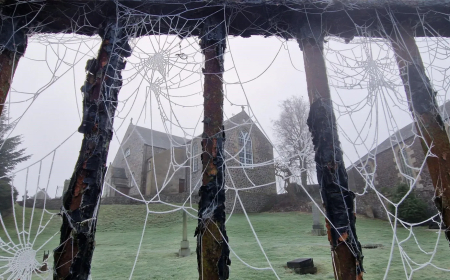‘We all have the capacity for evil’: Meet the psychiatrist treating society’s most violent criminals
After 30 years working in high-security facilities, Dr Gwen Adshead says radical changes are needed so prisoners can rejoin society safely

Dr Gwen Adshead is thinking hard about the question I’ve just asked her, which is whether she ever felt frightened by any of the violent offenders she encountered when working as a forensic psychiatrist and psychotherapist at Broadmoor – the high-security psychiatric hospital whose former patients have included Peter Sutcliffe and Ronnie Kray. She pauses for a moment, before arriving at the right word. “Disquieted, I think. But if they’re talking to me, the chances are that they want to be there – they’re communicating. The work I do, it’s kind of low-key: ‘Hello, Mr Jenkins, your team think it might be good for you to talk to me, how do you feel about that?’ And we’ll see where it goes. And if they get up snarling and say, ‘I’m going to rip your f---ing head off…’ I’d say, ‘Well, probably not today then. Perhaps another time.’”
She smiles sweetly. Adshead has spent 30 years working with perpetrators of violence, in prisons and psychiatric hospitals. She believes that, in order to reduce violence in society, it is imperative to understand all its causes and risk factors. She sees her role as almost like that of a naturalist – observing and keeping her eyes and ears open – but she is adamant that attempting to understand violence is not the same as excusing it.
These are all themes that she addressed in her 2024 Reith Lectures. She has extrapolated them into a book, Four Questions About Violence, which looks at whether violence is normal; if there’s such a thing as evil; whether people can change; and the relationship between violence and childhood trauma. The afterword “is an essay about goodness, because I had focused so much on bad things, I wanted to end on something good”.
Adshead, 65, lives in a village near Reading, Berkshire. I liked her immediately – her study and much of her house is delightfully messy, with piles of books and papers everywhere, and I enjoyed the fact that she didn’t attempt to apologise for this, as so many people (needlessly) would. “Authentic” was the verdict of our photographer, to Adshead’s great amusement.
“I’m a person who works with piles,” she says cheerfully. “My outer world is quite messy and cluttered, but my inner world is structured.”
Adshead has a direct, sympathetic gaze, and I wonder if it’s the same one with which she faces her patients. She writes in her book about the art of keeping her face composed and “nodding along” when a murderer explained to her in neutral tones the practicalities of dismemberment – how he had been forced to decapitate his victim after killing him, because a body is just too heavy to drag around and he needed to dispose of it. These offenders were anonymised, though she has written about briefly encountering Sutcliffe, the Yorkshire Ripper, at the very start of her career: “I felt shaken for a moment, and then it dawned on me that the shock was that there was nothing to see. He was just a man, not a monster.”
Her vast library of books is a source for the literary and anthropological quotes that are scattered throughout her writing. In 2021 she wrote a bestselling book (with Eileen Horne) called The Devil You Know: Encounters in Forensic Psychiatry, which was about patients she had worked with in Broadmoor – murderers, a sex offender, an arsonist, a stalker, a serial killer – and the results were fascinating. Not all of her endeavours were successful. A man who had sexually abused his sons later went on to die by suicide (“Shame,” she writes, “is such a soul-eating emotion”); and the supposedly reformed stalker who was assigned to Adshead for support after her release tried to co-opt Adshead into her mission.
The analysis of evil is a gripping subject which has preoccupied people for decades. Adshead does not believe that people are born bad; to write someone off as “an evil monster” is a bit of a cop-out, she feels. “I don’t believe people are born evil, but I absolutely believe that any and each of us can get into a state of mind that is cruel and unusual – that potential for cruelty is there in all of us.”
I ask her about the Southport killer Axel Rudakubana, who has consistently been labelled as evil, and how he might fit into her world-view. She has no inside knowledge, and only knows what she has read. “It seems like he had lots of assessments but not much intervention. Though, to be fair, what is the best intervention for a young man who is preoccupied with violence? We don’t have medication for that. We need to develop a large group of therapists who can actually work with disturbed young men. We have some, but we don’t have enough of them.
“The difficulty we face is that there are lots of young people who are interested in violence, who are known to Prevent [the Government’s anti-radicalisation programme], social services and CAMHS [Child and Adolescent Mental Health Services] but would never do anything like what Rudakubana did. Nobody wants to hear this, but unfortunately there are some kinds of events you just can’t anticipate.”
Adshead is scathing about what she sees as the sticking-plaster approach to treatment in the UK. “I think it’s hard to overstate the degradation of mental health services over the last 10 years. It’s a hugely complex and difficult area, but these things need time… [we need to] invest in long-term work. For example, we have some really good psychological interventions for complex mental health problems, but because they’re complex they take 18 months to two years to complete [so they are not implemented].”
Contrary to what we might pick up from media and television, Adshead emphasises that serial killers are very rare. She also thinks they are not very interesting. “Serial killers were always rare but seem to have become rarer still in the last 40 years, and there is solid international data to support this. The reasons are probably that crime-detection methods for homicide in particular have improved, and it is generally much harder for even the most vulnerable people to disappear than it used to be, with CCTV, communications, et cetera.”
Which brings us on to the subject of Lucy Letby. I am intrigued to know whether Adshead thinks that the lack of any apparent trauma or “childhood adversity” in Letby’s background is significant.
“I find her case completely baffling, and I don’t have anything clever to say about it, because the absence of childhood adversity pales into insignificance against the statistically wild improbability of a woman killing serially at all – it’s off the scale. The statistics are breathtakingly unlikely.
“And when you read about these kinds of cases – in this one, the prosecution was presented in enormous detail, and the defence was reduced to ‘a paragraph on page seven’. You have to put a complicated jigsaw puzzle together, and I never play a role in deciding if people are guilty or not – people like me are of more use once the dust has settled.”
The Reith Lectures were delivered in carefully selected venues – the first one was at the BBC, as is traditional, the second at the V&A in Dundee, the third at HMP Grendon, and the final one in Bergen in Norway. Grendon is a therapeutic prison in Buckinghamshire (offenders have to apply to be transferred to Grendon, and criteria are strict). This was the first time that a Reith Lecture had been delivered in prison, and there were inmates in the audience.
The key question in Adshead’s mind, and it’s an important one, is what is prison for? “Is it to take people off the streets who are risky to others – which seems to me entirely reasonable – but then you’ve got to help them sort themselves out; you can’t put them in a room with a bucket and say, we hate you. If you don’t give them education and you don’t give them work, then at the end of [their sentence], how likely is it that they’re going to be any different?”
In 2023 the UK spent £6.4bn on the “prison estate”. It costs on average £51,000 a year to keep someone in a basic prison. “And if we’re putting young men in prison for £50,000 a man, then we want some bang for our buck. You and I will have spent all that money to no purpose, so why not spend a bit more, and try to offer something that will actually help offenders be less risky when they get out? That might then cut our costs farther down the road.”
It’s a reasonable thought. “Literacy programmes reduce recidivism, for example, but I know a very senior criminologist and prison governor who introduced a substantial and effective literacy programme in his prison which was closed down because local people objected to prisoners getting literacy classes.”
But she is adamant that it is not a reward. “It’s an investment in keeping our communities safer, and it’s fiscally advisable. The Norwegians, for example, think it’s a no-brainer.”
Norway, Adshead thinks, is an excellent example of a country with a good penal system. They have a small prison population and a low rate of recidivism, and this is the reason why she chose Bergen to deliver her final lecture.
“The Norwegian penal system starts from the premise that the loss of liberty is the only punishment. The idea that you must have a terrible time as part of your sentence makes no sense to them.” In Norway, rehabilitation is a priority, and prison staff are divided into ordinary security guards and highly trained prison officers, who have to have a three-year degree in prison management. “And the really interesting thing is that their pay is not higher than the salaries we offer in the UK, but they stay in their jobs much longer because they are invested in working to help the prisoners succeed.”
She would like to see a similar programme introduced here. The UK has a problem with a lack of senior prison officers: “As part of the austerity programme in public services, and privatisation of the same, senior staff in prisons and hospitals were encouraged to retire. So the prisons lost a large tranche of senior people who had lots of experience; who were good at relating to prisoners and who could support new colleagues.”
Adshead absolutely believes in justice and consequences within a humane legal framework, but recognises that in this country there are huge challenges. If she were able to make some basic but radical changes, what would she do?
“How long have you got? The first thing I’d do is to greatly expand community solutions for non-violent offenders. It’s not that offences like theft and shoplifting are not important, it’s just that it’s not particularly well dealt with by putting people inside. If we stopped imprisoning people who are non-violent, then we could concentrate on people who are violent, and work out who are the ones we need to help and who are the ones we can’t.”
Next, she says, is affordable accommodation. “If a significant proportion of people are going into prison because they’re homeless, then that’s a very expensive way of providing housing. I knew one female prisoner who was constantly coming back. She said to me, ‘I like it here. They know me.’ Suddenly you’ve got a life inside which has all the structure and support that most of us value – food, roof over your head, something to do.”
Lastly, “I would like to see vastly expanded trauma services for people who have been victims of crime, and their families – because these are people who are often very distressed and angry themselves.”
There are reasons for hope. Adshead has seen excellent results from prison-based therapeutic communities, small groups which offer prisoners a chance to examine their lives alongside other prisoners, look at how they came to violence, and focus on how to improve their lives or make amends. There is also an active Church of England ministry in prisons, “and not just C of E. It’s quite something to think that we’re a country which has a Bishop of Prisons”.
One thing that has had a huge impact is restorative justice. In 2011, Jacob Dunne went to prison after assaulting someone with a single punch. He hadn’t meant to kill anyone, but after a day of drinking, he got into a fight and the man he hit subsequently died. (It is worth noting that 80 per cent of violent incidents involve intoxication.) Dunne went to prison feeling sorry for himself and vengeful towards the friend who had named him as the attacker. But when the parents of his victim contacted him via his probation officer and a restorative justice organisation, it was a wake-up call. “It was at this moment that I realised there were people involved in this crime who had been more harmed than me,” he has said. “After some reflection, I decided that the very least I could do was help them make sense out of what had happened.” Dunne went on to write a book, which was adapted into a play called Punch by James Graham – currently on in London’s West End.
“Being inside made absolutely no difference, but talking to the family and realising what he’d done, and putting together all the different factors that had led to that moment where he was drunk and out of control, helped enormously,” says Adshead, who met Dunne when he came to her lecture.
Adshead now works part-time in the NHS as a forensic psychotherapist, and provides expert reports for the family court. She is also a consultant and supervisor, and she teaches one day a week. Next year she has another book coming out called Unspeakable, focusing on trauma, identity and language.
I wonder how difficult it is to put aside some of the things she hears from offenders about their crimes, and if the unsavoury details haunt her.
But no. “Because it’s my work, and it’s interesting. In a way it’s part of my medical identity. That’s what I trained to do – to go to places and situations where people are very disturbed, so when I hear disturbed people saying disturbing things, I think, well, that’s what I’m here for – and when I walk out the door I think, end of another day.
“I’m semi-retired now, but when I was working full-time I was always with teams of people – and that’s really important. But on the whole it’s so much less interesting than most of the dramas about it – it’s not Jodie Foster and it’s very rarely Hannibal Lecter.”
She catches herself. “Well, sometimes Hannibal Lecter – but only briefly.”
[Source: Daily Telegraph]




















































